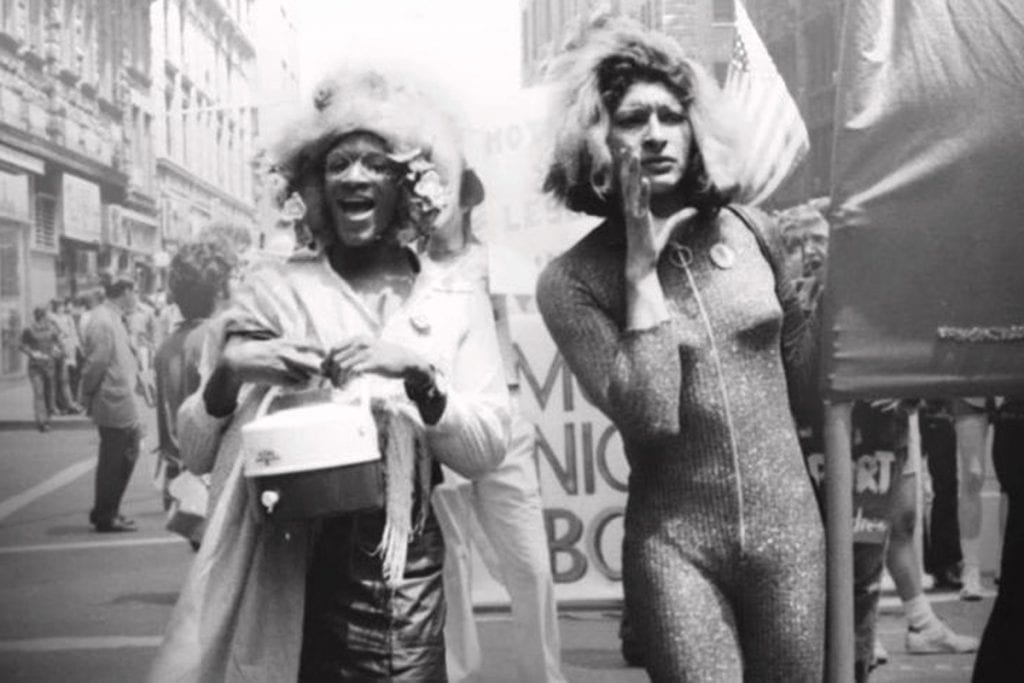Of course, we should all be celebrating Pride—but it’s simply not enough. There, I said it.
Over the years, the meaning of Pride for me has evolved—admittedly, I’m guilty of having celebrated Pride and done nothing more. It’s important to point out that I’ve been fortunate to have not endured the same level of persecution that is the crux of why Pride is celebrated in the first place.

Marsha P. Johnson (left) and Sylvia Rivera march in New York City in 1973 – photo courtesy of Netflix.
If there’s one thing you need to know in association with Pride, it’s Stonewall. Not the parade.
50 years ago, the Stonewall Riots took place in the wake of an early morning police raid at The Stonewall Inn in Greenwich Village, New York City. At that time, very few businesses welcomed LGBTQ customers, and businesses who did certainly flew under the radar.
The importance of Stonewall is both symbolic and emblematic of society today. The Stonewall Inn was a business that welcomed the most marginalized people in the LGBTQ community: drag queens, transgender people, effeminate young men, butch lesbians, male prostitutes, and homeless youth. The significance here is that the very people targeted during the police raids, were the people that stood up strongest for the LGBTQ community. They are the reason we celebrate Pride today.
During the riots, it’s widely speculated that drag queens, homeless youth, the trans community, and a lesbian are largely responsible for the uprising. Two of the people most central to the riots were Marsha P. Johnson and Sylvia Rivera—a duo of brave transgender women who initiated the beginnings of fighting back for what’s right.
Unfortunately, 50 years later, these same groups continue to be the most marginalized and the most overlooked.
Ketchum’s culture of always being a force for good has taught me that individual efforts, no matter how big or small, have the ability to make an impact on our communities. The responsibility I have as a marketer and communications consultant is to help brands usher in a more inclusive society. I feel that same accountability in my personal life, too.
Here are four important and worthy organizations you can get involved with—through service or donation—to make a difference in the lives of marginalized LGBTQ people who still need our help today:
Ali Forney Center
The Ali Forney Center protects LGBTQ youth from the harms of homelessness and empowers them with the tools needed to live independently. The organization’s namesake, Ali Forney, was a gender-nonconforming teen who fled his home at 13. He entered the foster care system where he was bounced around to several homes and was beaten and abused. Before his tragic death in 1997, Ali was dedicated to helping other young people and publicly advocated for the safety of homeless LGBT youth.
Hetrick-Martin Institute
The Hetrick-Martin Institute creates this environment for lesbian, gay, bisexual, transgender, and questioning (LGBTQ) youth between the ages of 13 and 24 and their families. Through a comprehensive package of direct services and referrals, Hetrick-Martin seeks to foster healthy youth development around the country.
National Center for Transgender Equality
The National Center for Transgender Equality advocates to change policies and society to increase understanding and acceptance of transgender people. In the nation’s capital and throughout the country, NCTE works to replace disrespect, discrimination and violence with empathy, opportunity and justice.
SAGE
SAGE is the country’s largest and oldest organization dedicated to improving the lives of lesbian, gay, bisexual, and transgender (LGBT) older adults. Their mission is to lead in addressing issues related to lesbian, gay, bisexual, and transgender (LGBT) aging.
Every June I find myself digging a little deeper on what pride means to me. Today I understand that Pride has no orientation. It’s irrelevant when lending a helping hand. Pride is a time to reflect on our past, honor our differences, and fight together for our future. I also now know that if there’s one thing you need to do this Pride, it’s do more than celebrate… go get involved.
I will. Will you?


